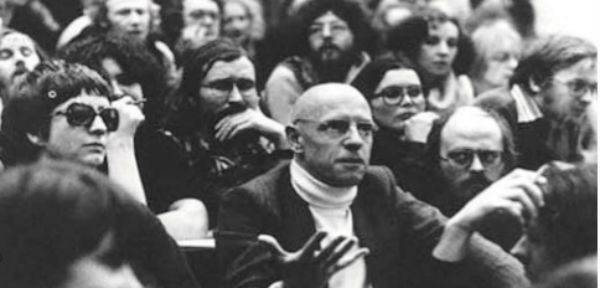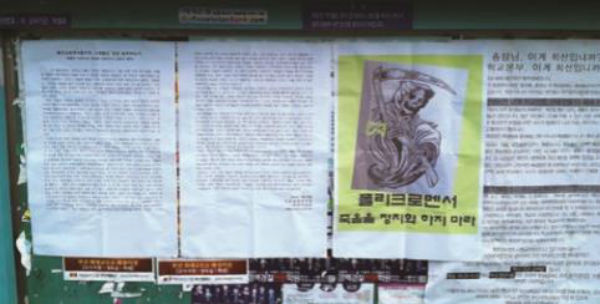Korea has slowly become a quiet society where everybody fears to speak in front of others. During the 1980s, even young university students went on the streets to demonstrate and make their voices heard to the government. Since 1987, Korea achieved democracy to some extent, and those who fervently protested against the government have now become middle-aged. The daughters and sons of those generations are now attending universities across the country. Young university students, unlike their parents, fear openly expressing their thoughts in public. Even though they face irrationality on campus, they do not speak up, but rather worry about the repercussions that they might have to face from professors and the university. The exam papers that students submit no longer contain genuine thoughts of young students, but rather scribbled words that closely resemble those of their professors. The Sungkyun Times (SKT) will have a closer look at the silence that permeates the general atmosphere in the modern society of Korea.
What Is Silence?
Silence is generally perceived as a word with a negative connotation, since it gives the impression of passiveness to a certain degree. It can, however, also be active, because people can choose to be silent in order to express their thoughts indirectly. Silence can be chosen, but it can also be forced by someone. For instance, suspects of a crime can “plead the Fifth” to defend themselves. There are two types of silence, as described below.
Pro-Social Silence
Pro-social silence occurs when a person intentionally omits certain information and gives up his or her right to speak for the benefit of the groups or individuals that he or she wants to protect. This often occurs when people find out that their disclosure can hurt their favored people.
Defensive Silence
Defensive silence, on the other hand, stems from fear, and it appears in the form of protecting people themselves. In Korea, many young people, especially those in the age around college graduation, deactivate their social network accounts in order to hide sensitive information that can possibly lead to failure in their job search. In fact, an anonymous employee of a human resources team for a company confessed that many companies do check the social networks of applicants that they are considering to hire. Social networks contain a lot of information about an individual, including a person’s political views, sexual orientation, personal favors, and many other preferences. As a result, the “Nuntingjok,” which refers to a person who only consumes contents on social media instead of producing new contents or comments, is easily seen among young Korean Facebook users.
Why College Students Decided to Remain Silent
Absence of Reliable Authority One of the most significant reasons college students maintain their silence is because of the absence of trusted groups in the country. The absence of dependable groups, including those of governmental bodies, leads to the omission of social minorities who need help and attention from others. The social outliers remain quiet because they have learned through experience that speaking out does not help their current situation. This may give rise to the following question: is Korea really absent of sincere governmental bodies that can give a hand to the forgotten people? The statistics from 2014 by the Transparency Organization somewhat support this view. All candidates of 175 countries were assessed based on the level of transparency that each government has, and Korea ranked 43rd in the group for receiving only 55 points out of 100. This score of 55 points implies that the government barely escapes the level of absolute corruption. Even inside Korea, people do not really give trust to the officials of the country. Ideally, legislators are those who listen to the voices of the voters and change their wishes into reality. That is one of the main reasons why people of different districts and cities vote for their own candidates to be legislators. The members of the National Assembly have generated a negative view after failing to reflect the voices of the people, instead pursuing their personal benefits. Statistics from 2015 show that one of the most trustworthy governmental bodies of the country was the post office, not the National Assembly. Legislators are expected to listen to the voices of people but are in fact the least reliable government officials. The same research revealed that those who absolutely trust the legislating body are only one percent, while those who trust it to some extent are 16.4 percent of the population. Therefore, the alleged assertion (사진 17) that social outliers do not expect a lot from the country and rather choose to keep quiet is becoming more convincing. As a result of the distrust of government, minorities are muted. Furthermore, because there is no serious debate over the concerns of minorities, the public has less chance to share their thoughts on the issues. In other words, people do not feel empathy for the issue. College students are continuously silenced even after graduation, not only because they do not feel empathy toward the issue, but also because they believe that as individuals, they cannot change the society as easily as they expected. Now, many universities in Korea are facing merger issues of undergraduate departments, but those who do not take the issue seriously do not really care about the cases that happen in other universities.
Power of State and Internalization of Surveillance
Modern society is often referred to as the Panopticon. The Panopticon is a structure of a prison devised by English philosopher Jeremy Bentham, and the structure enables wide surveillance of prisoners with a minimum number of guards. The guards can watch the overall chambers of the prison, but the prisoners cannot see whether there actually is a guard in the center of the prison because of a strong light. Because prisoners are not certain whether they are actually surveilled or not, they become more cautious with their conduct and constantly monitor their own behavior. In modern society, though not exactly in a same way as the Panopticon, people are worried about the government’s attempts to encroach on people’s privacy. Such attempts became more visible when Kakao, Korea’s leading mobile messenger company, refused to provide private information of its users to the government in September 2014. The refusal implied that there already had been some attempts by the prosecution, and people became anxious as a result of this news. Even though judicial authority has the right to gain information about suspects in some cases, it was viewed as an excess encroachment by the government. After the case, there was a massive exodus from KakaoTalk to alternative messengers. Telegram became popular for a while because Telegram was thought to be safe from the investigation of Korean prosecutors. After two years, another case heated up the anxiety of Koreans, which is known as the Terrorism Prevention Acts.

The leading party’s struggle to pass the bill, which would expand the rights of government authorities to surveil highly suspected terrorists, created severe opposition because the definition of a “suspicious terrorist” could have been equivocal. Innocent people could become the victims of wide surveillance. Moreover, under the circumstances in which people have very low reliance on the government, people become even more protective of themselves, being silent in open places such as the Internet. As a result of the successive issues, young students, who are generally expected to be more active in voicing their opinion against the government compared to the conservative elderly, are afraid to speak out. They constantly refine or censor their language and opinions, worrying that their thoughts might seem very inappropriate. French philosopher Michel Foucault called it an internalization of surveillance, in which people censor their thoughts by themselves in order to avoid consequences that might follow after expressing their thoughts.

Social Consolidation of the Corrupted
Social consolidation is the last main reason that renders students quiet. In a society where there is a low level of credit and trust, people start grouping themselves based on common backgrounds such as their universities, hometown, and many other criteria. In the 1960s and 1970s, there was a close connection between politics and economic circles in Korea. They maintained their consolidation through remaining reticence on each other’s secret or weak points. Today, such form of consolidation is observed among universities that enjoy privileges. In Korea, the name value of universities plays a big role in judging one’s ability and disposition. Specifically, those who have taken advantage of the privilege do not want to give it up and thus, they choose to keep silent. This closed society has generated a cartel where people from the same universities receive better respect not based on their abilities, but rather on the name of their university.
Attempts by College Students to Speak Out
Despite prevalent secrecy among university students, some struggles exist among students who want to make their voices heard against the irrationality.
Bamboo Forest
Facebook pages called “Bamboo Forest” has become popular among university students. Students can express their thoughts anonymously, and most universities in Korea have a Bamboo Forest page. Many issues come up on the page, from a trivial love affair to grand issues such as elections, sexual harassment, and many other provocative ones. Although the number of students who actually participate in protests has decreased, students still try to make their voice heard on anonymous pages, meaning that young students changed the medium of their messages. As long as anonymity is guaranteed, students still have some desire to project their voice on very serious issues.
Hand-Written Posters
Hand-written posters could easily be seen in most universities during the 1980s when young students actively participated in the demonstrations to achieve democracy in the country. Nevertheless, from 2000s, hand-written posters faded from history as Koreans became complacent for achieving a certain level of democracy. In 2013, hand-written posters were rejuvenated as a student of Korea University posted, “How are you all doing these days?” It is still hard to say that the hand-written poster regained its popularity, but it is meaningful in that students are taking a small step toward creating a voice.

In a closed society where people are not used to a debating environment, one’s exertion to dig out information makes others more protective of themselves. On our campus, interview questions about the opinion on government designated textbooks, originally devised to listen to the thoughts of possible candidates of campus employees, became a controversial issue. The reason for the heated debate might have something to do with our closed society. The phrase “Judge, my cat wrote the comment” is a manifestation of young people’s desire to express while worrying about being surveilled at the same time, blaming on cats to avoid their faults. The joke is not as humourous as it seems. We are dancing in the masquerade, and people are scared to take their masks off for different reasons. Who should we blame?
